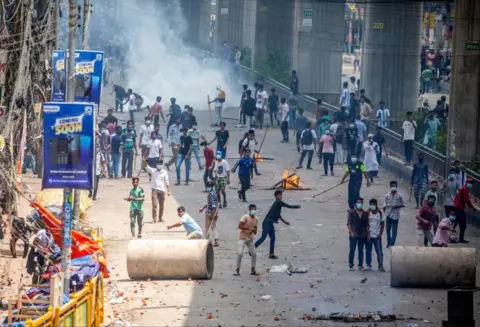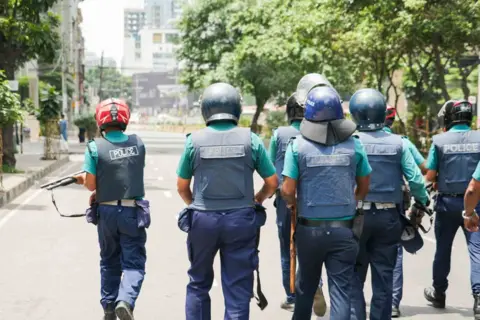Bangladesh students defy ban to continue protests
Protesting students have returned to the streets of the Bangladeshi capital Dhaka, defying a ban on public rallies following a day of clashes which left dozens dead.
Symbolic funeral processions were planned to pay tribute to at least 25 people killed on Thursday.
Two more deaths were reported on Friday, bringing the total since protests started to at least 33 – although the exact toll is difficult to assess due in part to an almost complete communications shutdown, with mobile internet and telephone lines reportedly down.
The shutdown comes as authorities try to quell the protests demanding the government scrap a job quota for the families of veterans of the country’s independence war in 1971.
Bus and train services have reportedly also been halted, while photos from Dhaka show large numbers of police in riot gear on the streets.
Schools and universities across Bangladesh have also been shut until further notice.
But this has done little to stop the protesters, who vowed to continue with their own “Complete Shutdown”, which has seen them blockade roads across the city.
On Friday, students chanting “merit, merit” and “we won’t let the blood that has been shed of our brothers go in vain” were joined by a number of parents outside Dhaka university.
The students are arguing that the quota system is discriminatory, and are asking for recruitment based on merit. Critics say the system unfairly benefits the families of pro-government groups who support Prime Minister Sheikh Hasina, who won her fourth straight election in January.
A march organised by Islamist parties was met with tear gas, rubber bullets and stun grenades.
 EPA
EPAThe main opposition Bangladesh National Party has also called for protest, with the exiled acting chairman Tarique Rahman asking people to support “these tender-hearted students” in a post on Twitter.
The party said one of its senior leaders, Ruhul Kabir Rizvi Ahmed, had been taken into custody. Police did not give any reasons for Mr Rizvi’s arrest.
Attempts to end the protests with talks have so far failed.
Law Minister Anisul Haque told BBC Bangla the government was open to discussing the issues: “I’m sure they are also discussing whether they will come to the talks or not.”
But student Nahid Iqbal told the BBC on Thursday they would not consider joining the talks at present.
“The government has killed so many people in a day that we cannot join any discussions in the current circumstances.”
 BBC Bangla
BBC BanglaEarlier, Dhaka Metropolitan Police Commissioner Shafiqul Islam told the BBC that authorities had decided to ban rallies in the city in order to protect lives and property following Thursday’s violence.
Separately, the police confirmed to BBC Bangla that two people had died on Friday.
Police said 100 officers had been injured on Thursday, while a government minister said several vehicles parked outside government buildings were set on fire.
The clashes have also not been confined to Dhaka, with 26 districts reporting incidents.
The protesters who occupied and set light to the state broadcaster BTV had left by Friday morning, although the channel had not started broadcasting again.
A senior reporter told BBC Bangla the newsroom, studio and canteen had all been damaged in Thursday’s fire.



